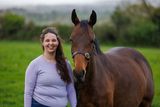'There was grief, anger and frustration'- How I found solace in nature after my brother's suicide
Aidan Roberts has been on a unique journey of discovery for most of his life. He tells Joy Orpen how a personal tragedy brought him to the realisation that stilling the mind was the remedy for some of the challenges he faces
Aidan Roberts, pictured with his chitar, says he was caught up in a ball of grief. Photo: Mark Condren
Music must be Aidan Roberts's middle name.
With seven siblings who play myriad different instruments, songs, clefs and quavers lie at the core of their existence. "It started with my dad, Matt Roberts," explains Aidan, who is in his early 50s, but looks much younger. "He's a versatile, talented musician, who passed on his love of music to us."
And ever since, Aidan has continued to compose and play beautiful music, and to build innovative instruments. But he has another equally consuming passion, and that is a lifelong search for truth and inner peace.
Over the past 20 years, Aidan has studied and practised Buddhism, Taoism, Advaita Vedanta (a Hindu philosophy and religous practice), acupuncture, t'ai chi, chi gong, yoga and numerous Eastern philosophies and practices. These studies have taken him to China, India, Taiwan, Thailand, England and America. So, all in all, Aidan was leading a pretty fulfilling existence until 2008; his emotional and spiritual strength were severely challenged when Gary, his much-loved older brother, took his own life.
"He was extremely creative - in fact, he was bordering on being a genius," says Aidan. "At one point, he built a hovercraft which was big enough to sit in. He loved creative challenges."
Aidan recalls a particular adventure, when, as children, he and Gary used an inflatable boat to reach an island to collect duck eggs. Unfortunately, the boat sank, so the hapless schoolboys had to swim back to shore.
"He was a fun, happy-go-lucky, adventurous brother," Aidan says.
In time, Gary married and had three sons. Aidan describes their home as a "real boys' house, with lots of fun and energy". Then, one fateful day, Aidan got a nightmarish call to tell him that Gary was gone. Though it's now nearly eight years later, he still cannot find the words to describe what he felt at the time.
"The pain and suffering for his wife and children must have been unbelievable," Aidan says. "I couldn't even begin to imagine what they went through. If I could have taken away some of their terrible pain, I would have done so gladly."
In spite of this awful tragedy, Aidan had no option but to try to move on with his life. However, about a year later, he began to have what he describes as a "severe reaction".
"I experienced extreme emotions," he explains. "There was grief, anger and frustration. I was hugely caught up in a ball of grief. I made a number of calls to bereavement counselling services, but the conversations didn't work for me. So I decided I wanted to spend some time in nature; I wanted to see what would happen when I quietened the mind - to see what would arise."
Aidan went to La Gomera, an island in the Canaries. Armed with a sleeping bag, a blow-up bed and a single-ring cooker, he camped in a cave in a mountain. "It was beautiful," he says.
He spent five weeks in almost total, solitary confinement. Once a week, he would trek to the nearest village to stock up on supplies, which he had to haul up the mountain. The experience did help him get him in touch with his feelings.
"A lot of grief was coming up; some of it had to do with Gary, and some was my own stuff," he explains. "I was watching the mind, watching the body, being present to the grief. But I was still very caught up in the mind, trying to figure out what was going on and why."
Then, one day, Aidan was sitting quietly, when a white butterfly brushed gently across his face, with surprising and enlightening consequences.
"I got a strong sense that nature was tapping me on the nose and saying, 'Hey, wake up, look at all that nature around you. There is too much going on in your head; there's too much thinking about suffering.'"
Realising that there would be no peace if he depended solely on his mind, Aidan began instead to look at ways to quieten it.
"By then, I was very motivated to find a better way to be," he says.
He had practised mindfulness with Thich Nhat Hanh (a renowned Vietnamese Buddhist monk) in Plum Village in France, in 1993. So now, 15 years later, he decided to return to that same village; he spent three months camping in the forest there.
"When I arrived, the monks left a note in my tent which read, 'Your suffering is most welcome here.'" Aidan recalls. "There was a lot of loving-kindness practices at Plum Village; it felt like family. And that got me in touch with my heart. The experience allowed me to embrace grief in a healthy way. When I came back to Ireland, I felt I had tangible tools to work with."
Consequently, Aidan did teacher training in mindfulness-based stress reduction (MBSR) with the University of Massachusetts Medical School; he then did further studies in mindfulness-based cognitive therapy (MBCT) at the University of Bangor in Wales, and the Oxford Mindfulness Centre at the Department of Psychiatry at Oxford University. He quotes world authority Jon Kabat-Zinn, in describing mindfulness: "It's paying attention on purpose, in the present moment, non-judgementally, and as if your life depended on it."
Currently, Aidan runs the Dublin Mindfulness Centre in Ranelagh.
"I believe that mindfulness is a precious practical gem," he says. "Although I have studied and practised many forms of meditation, I find that bringing mindfulness into play helps cultivate calmness, clarity, insight and acceptance. I now use music and mindfulness to help people cultivate healthy states of mind, so they may find a better way to be in relation to themselves and others."
Over the years, Aidan has designed and made various instruments. His current favourite is one he calls a "chitar", with which he's pictured above. It's a two-necked finger-tapping instrument that resembles a guitar. Aidan can play it while doing a standing meditation with his arms stretched in front of him. In June, he played his chitar for a delighted audience, including the Indian ambassador to Ireland, in Dartmouth Square to mark World Yoga Day.
This summer, he will be leading mindfulness practices and playing the chitar at the Another Love Story Festival in Co Meath, which is on this weekend, and in Electric Picnic's Global Green Area.
"I've found ways to quieten the mind and to nurture contentment," says Aidan. "The songs that I am composing on the chitar are inspired by mindfulness practice. The lyrics use metaphor to clarify the practice, while the music supports it," he concludes, having come full circle.
See dublinmindfulnesscentre.com
Join the Irish Independent WhatsApp channel
Stay up to date with all the latest news














